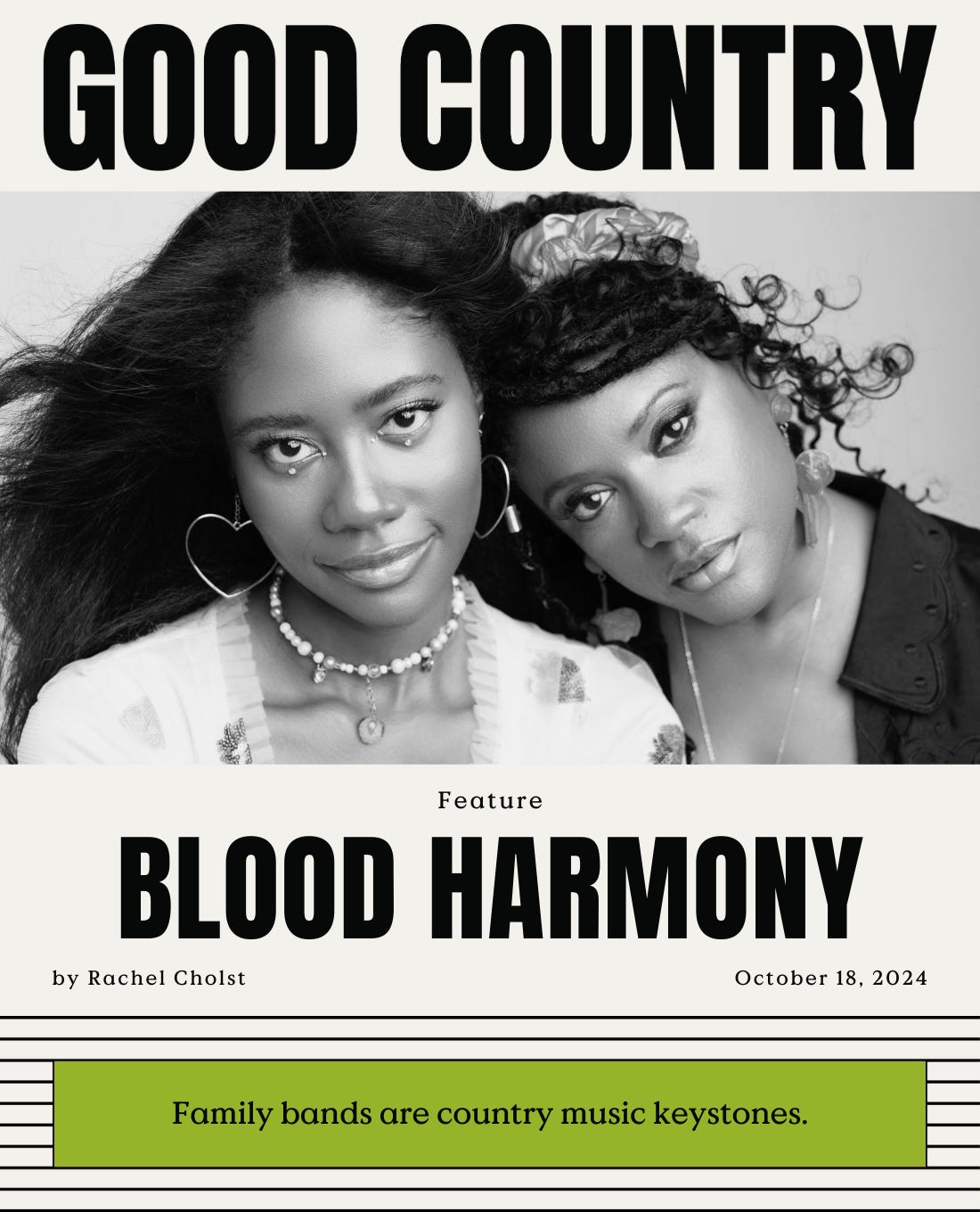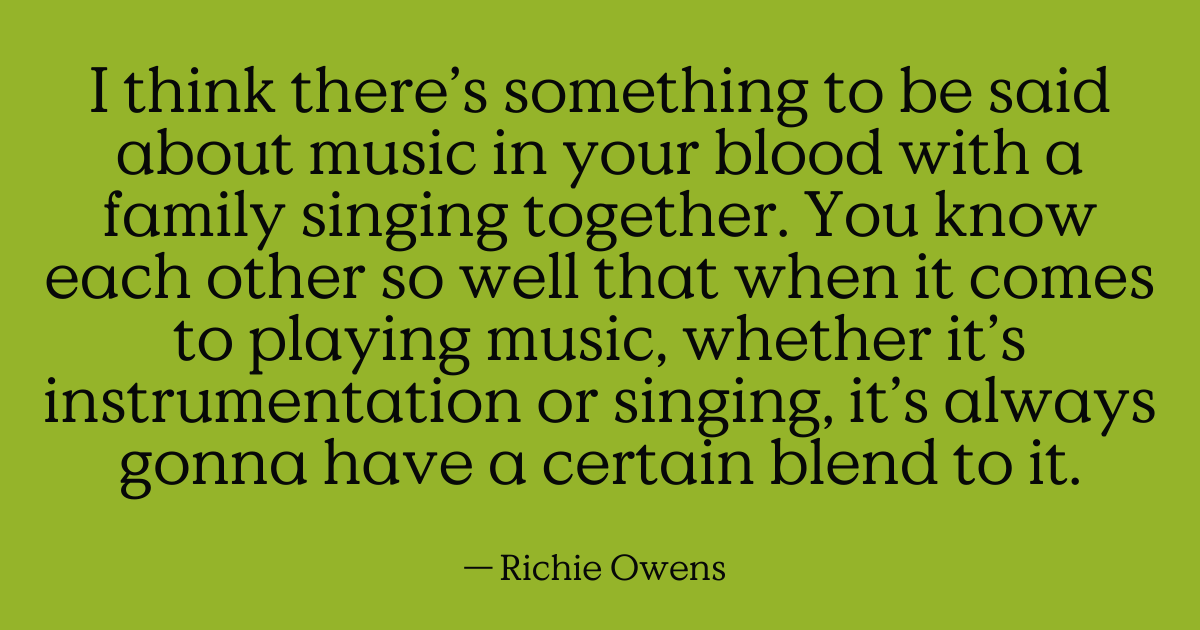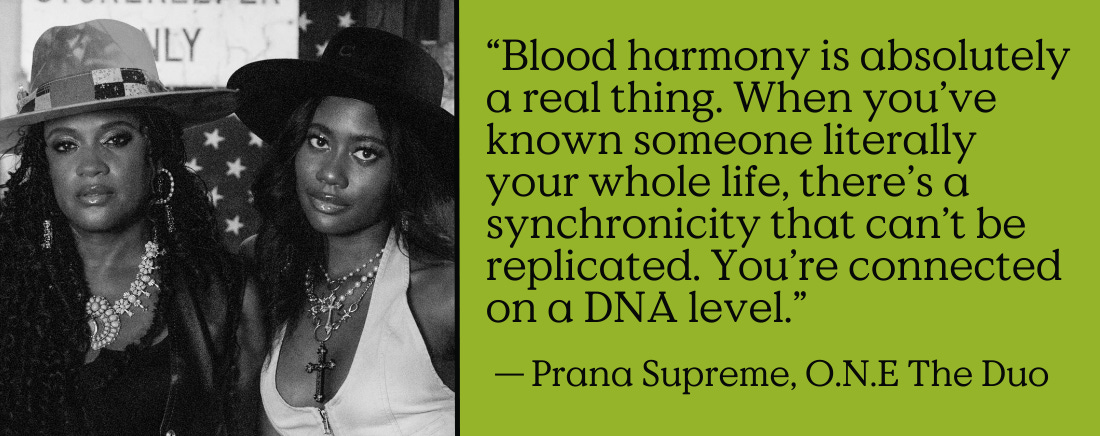We all know Superman’s origin story: a rocket ship crash-lands in a Kansas cornfield, a baby who will develop unimaginable powers rescued by an elderly childless couple. If country has a similar smoking crater, conventional wisdom points to the Carter Family, with Mother Maybelle Carter’s distinctive “Carter scratch” picking style paving the way for that je ne sais quois that makes country music country.
As those staid histories of country tell us, the Carter Family became sensations when their evocative harmonies were put to wax by Ralph Peer in 1927. (In her book My Black Country, Alice Randall argues convincingly that Mother Maybelle in fact learned the picking pattern that bears her name from Black guitarist Lesley Riddle. From its very beginnings, country has been rooted in consumers’ conflation of “authentic” rural life and whiteness.)
Family bands can be found in so many key moments of country history. The Louvin Brothers performed searing duets that proudly replicated traditional sounds with an uncanny urgency, their lifelong experience singing with each other producing an eerie tone that threatened to swamp their individualism. Meanwhile, the Everly Brothers revived a genre that was seen as increasingly backwards and stultified. With one foot in rock and roll and the other in country and gospel, the Everlys’ sweet tones and seeming sincerity made the syncopated beats of rock – seen as scandalous due to its association with Black artists – into a safer and more accessible sound to country fans. The countrypolitan sound, with its full orchestras and staid yearning, was championed by none other than husband-and-wife duet George Jones and Tammy Wynette.
Country is not unique in generating family bands – from the Carter Family to the Jackson 5 to the Osmonds to Hanson to Billie Eilish and her brother Finneas, there are many families that stud the constellations of American music. But the Carter Family set the template for country stardom, and it’s nigh impossible to avoid familial bonds even in contemporary country music: the Castellows, the Brothers Osborne, and even newcomers Track 45 bring a welcome synchronicity to a field of solo artists and duets that are manufactured on Music Row. Even when you take the off-ramp to Americana, you find acts like Rising Appalachia, the Roches, and more spouse-spouse acts than you can shake a pick at.
There are a number of reasons for that. Richie Owens, cousin of Dolly Parton and producer of the upcoming album, Dolly Parton & Family: Smoky Mountain DNA – Family, Faith & Fables (out November 15 on Virgin Music Group and Owepar Entertainment), observes that this is just what families have done for generations – especially his.
“We’ve always been married into other music families. It’s part of that Smoky Mountain DNA,” he explains. “A lot of families do that up in the Smoky Mountains – they play music and perform together. From meeting each other on a Sunday afternoon before church, getting together with food and music before service, or weekends at different family members' homes.”
On the album’s title track, Dolly proudly sings of her love and affinity for the region: “It's in my blood, it's in my soul, it's in my DNA.” There’s no mistaking her voice, but in the background are several generations of Parton’s extended family, providing a comforting wall of sound.
“I think there’s something to be said about music in your blood with a family singing together,” Owens observes. “You know each other so well that when it comes to playing music, whether it’s instrumentation or singing, it’s always gonna have a certain blend to it. Not that you cannot achieve great things with other people playing.”
There are also practical considerations – like the necessity of acoustic instruments. But then there’s the content as well. “In pop music, for example, there’s certain subjects that are commonplace to cover, but you might not wanna sing about those alongside your family,” observes Prana of O.N.E The Duo. Prana and her mother Tekitha weave effervescent soundscapes that play with the borders of country, pop, hip-hop, and soul.
“Country and roots lends itself to family bands, because there’s a broader range of things you can talk about in the genre. Country feels like a genre in which the oral history of a family would be shared. Folksy fireside stories everyone can take part in.”
Identical twins the Kentucky Gentlemen observe that it’s all in the name: roots. “Country is all about life and living, and family is where your roots are planted and come from most of the time. It's only right that country music feels like home for family voices.”
For all three of these acts, music – and making music together – forms some of their earliest memories.
“We’ve been making music together since we were 7 or 8 years old,” the Gentlemen recall. “We remember trying to imitate every singer we saw on TV. We made our parents sit down for every living room performance – which led them to getting us and our older brother guitars and a piano. That was when we officially began writing and creating our own songs.” Long before the twins came to Nashville, they were stars in their small town of Versailles, Kentucky. “We shared a cell phone as kids and we wrote a song for our voicemail. To this day people still sing that song to us. Come to think of it, that’s probably when The Kentucky Gentlemen unofficially began.”
Tekitha’s earliest memory of Prana, she jokes, is her daughter’s birth. Naturally, Prana learned to sing through her mother.
“My earliest memory of making music together is when I was about 7 years old and at one of my mom’s studio sessions. She carved out some time for me to record a song. I had written a song about how much I love my family and the sky – classic 7-year-old musings,” Prana chuckled. “Mom helped me get my delivery right and, honestly, for a 7-year-old it’s not a half-bad song!”
Tekitha knew her daughter had something special when Prana, at 2 years old, would repeat Tekitha’s melodies.
“During one of my rehearsals at my bass player Djibril’s studio, we started jamming so Prana could freestyle. It went on for probably 8 minutes and towards the end I remember she hit this crazy high C note. The band and I all locked eyes with this look of ‘look at her go!’ I can still see Ramsey [Jones], Prana’s cousin and my drummer at the time, who had the biggest smile on his face as she held out this note.”
With a musical lineage that includes Dolly Parton, Owens can’t remember a time when he and his family weren’t making music.
“My family has always made music together, from my earliest memories. I remember playing on the radio in Knoxville and singing with my dad when I was eight years old. We always got together with family members, including Dolly, and played at family get-togethers and at my grandfather’s church. We continued to perform together at Dollywood when it opened in 1986.”
It’s often said that if you spend 10,000 hours practicing something, you’ll become a master at it. It stands to reason that if you start the clock singing with someone from infancy, making music together as an adult seems effortless.
“When we’re performing together, we don't feel like we have to think hard about singing and putting on a show on stage,” the Kentucky Gentlemen explain. “It just flows like butter.”
In country music, this concept is called blood harmony.
“We definitely believe in that. It just hits differently. Even when our harmony isn’t perfect, our voices still blend somehow. We consider that a blessing.”
Sometimes there can be too much of a good thing, and family bands certainly spend more time together than most American nuclear families. In addition to family time, these artists tour together and navigate the music industry as a unit. The roles of bandmate, coworker, confidant, creative partner, and loved one are all rolled together – and those roles can sometimes conflict.
“Communication is king! Being able to speak freely and with respect for each other helps us maintain healthy boundaries between our relationship as mother-daughter and as business partners,” Tekitha of O.N.E The Duo explains. “We are working towards the same goals, which makes finding understanding when things get hard a much easier feat. We also make sure to have lives outside of each other – there’s obviously so much overlap of people in our lives that it’s important we have some things that are just for us.”
The Kentucky Gentlemen also make sure to create an open line of communication and boundaries when it matters. “We spend so much time together just being The Kentucky Gentlemen so we make it a priority to keep a pretty open and honest relationship and line of communication. Giving each other our space when we need it, or are asking for it, goes a long way. It helps making decisions for our joint career a lot easier and less selfish. We’re big on a solo fishing or shopping day, or even just spending a couple hours cruising back roads for some self-love and care.”
Owens finds business and pleasure go hand in hand.
“Touring was always enjoyable, whether we were doing it at Dollywood or with Dolly herself when I was an adult. It’s back to that blood thing – there’s always something to be said about that feeling you get when you’re doing that.”
And, of course, the business side of things, is also about preserving the family legacy.
“My cousin makes her own business decisions. As everyone well knows, she’s excellent at it. She needs no help! In regards to myself, I’ve been asked to do certain tasks in regards to music and our history of the family. I stay focused with that and I’m blessed with the opportunity that she’s given me to do that with her.”
“There’s a kind of connectedness with a family member that will always be different from performing with someone who isn’t related to you,” says Prana. “Blood harmony is absolutely a real thing. When you’ve known someone literally your whole life, there’s a synchronicity that can’t be replicated. You’re connected on a DNA level.”
Lead Image: O.N.E The Duo by Ford Fairchild.








